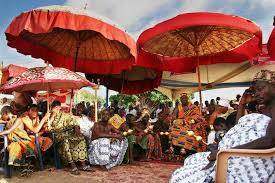Chieftaincy Conflicts in Dagbon and Akyem: A Quest for Leadership Resolution
Chieftaincy disputes in Ghana, particularly in traditional areas like Dagbon and Akyem, reflect the complexities of succession and rightful leadership that have persisted for generations. These conflicts often stem from historical grievances, cultural practices, and competing claims to leadership positions, resulting in deep divisions within communities.
In Dagbon, the chieftaincy dispute gained international attention when the late Ya Na Yakubu Andani II was killed in 2002, igniting a conflict between the Andani and Abudu clans. This violent episode led to a protracted struggle over the Dagbon skin, with both factions asserting their legitimacy. The ensuing chaos disrupted social order and economic activities in the region. The government intervened, and after years of negotiations, a resolution was reached in 2006, resulting in the installation of a new Ya Na, Abukari Mahama II. However, tensions remain, as factions continue to vie for influence, illustrating the fragility of peace in the region.
Similarly, in Akyem, disputes often arise from succession issues related to the chieftaincy of the Akyem Abuakwa traditional area. The struggle for power between various factions, coupled with disputes over royal lineage, has led to conflicts that affect local governance and community cohesion. The chieftaincy issues are often exacerbated by external political influences, with politicians sometimes leveraging these disputes for electoral gain, further complicating the resolution process.
Efforts to resolve these conflicts have included community dialogue, mediation, and the involvement of traditional councils. The National House of Chiefs has also played a pivotal role in promoting peace and reconciliation. By fostering dialogue among conflicting parties, traditional leaders aim to restore trust and find common ground. However, achieving lasting resolutions requires addressing underlying grievances, promoting inclusivity, and respecting traditional customs.
The resolution of chieftaincy disputes is crucial not only for restoring peace but also for ensuring the continued relevance of traditional institutions in contemporary governance. As these conflicts unfold, the need for a more robust legal framework to manage succession and chieftaincy disputes becomes increasingly evident. Balancing traditional practices with modern governance principles is essential to ensuring that leadership transitions occur smoothly, fostering stability and unity within communities.
In conclusion, the ongoing conflicts over chieftaincy in Dagbon and Akyem serve as a reminder of the intricate interplay between tradition and modernity in Ghana’s governance landscape. Addressing these disputes effectively is vital for the social fabric and development of the affected regions.



No comments yet
Be the first to share your thoughts!